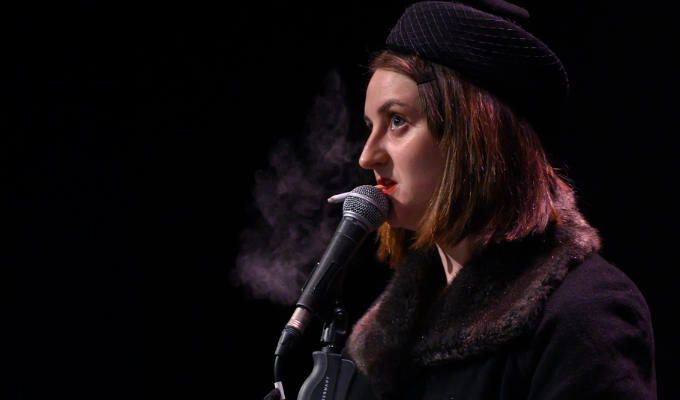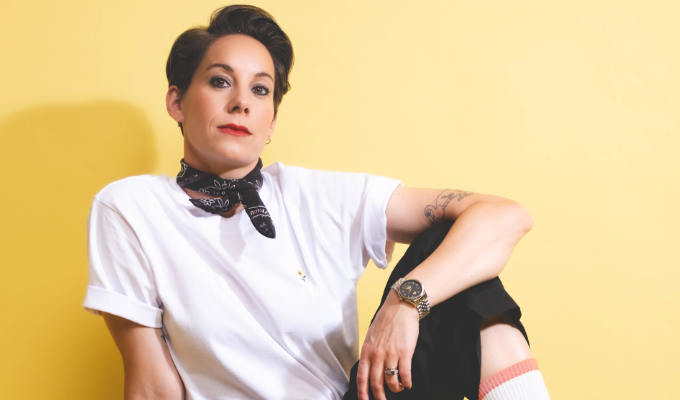 © Steve Ullathorne
© Steve Ullathorne Funny Women final 2022
Review of this year's female comedy showcase
It was a secret vote from industry judges, but Lorna Rose Treen’s victory in this year’s Funny Women final must surely have been a landslide.
Although character comedians sometimes come a cropper in stand-up competitions, given the different vibe they bring, Treen’s off-kilter energy and unflagging commitment to the silly easily won over the Bloomsbury Theatre audience.
She performed as a femme fatale straight from the pages of a Raymond Chandler novel, with both a cigarette and a sassy comment forever on her lips. The persona forces a deadpan on her ridiculous writing, highlighting the surrealism by playing it so straight, with only the occasional nod past the fourth wall to acknowledge the stupidity. Meanwhile, the set is tightly packed with daft gags, both visual and verbal – including some enjoyably bad puns, beautifully sold.
Treen’s got range, too, as she showed by winning a separate award for the best short film in the guise of an eager badge-hungry Brownie. Her work – and this alter-ego especially – invites comparison with Morgana Robinson’s cheery, affectionate parodies. A stack of TV roles surely await Treen too.
Second place went to Marjolein Robertson, probably the most experienced comic on the line-up with five solo Edinburgh Fringe shows to her name already. That is surely why she has such a strong sense of who she is on stage.
Robertson is from the Shetlands, and plays to the stereotype of a wide-eyed innocent in the big city – the sort of person who actually brought a leg of lamb to her student digs so she could recreate an island delicacy – though how much of that naivety is affectation and how much is true is enjoyably blurred. But it makes for a disarming low-key persona, easy to underestimate how savvy she’s being in her storytelling.
Third place went to Jessie Nixon, who also had a few references to her home town – Bristol, in this case - in her set. Her material is warmly delivered but has a bit of bite, especially when she takes down the coke-fuelled colleagues in her previous job.
Meanwhile, she fesses up to some of the less alpha behaviour she gets up to when left to her own devices, happy to lean into the yuk factor while also championing body positivity without being too strident, entirely in keeping with her appealingly natural, unforced delivery.
Opening the evening, Indian comic Anshita Koul struck a rather odd note, boasting about her 10,000 followers while accepting that’s not so impressive in a nation of more than a billion. Or indeed 67 million, so it’s baffling why she dwelt on it. Much of her fractured material, sardonically delivered struggled to connect. One exception was the elaborately truthful answer to the ‘how are you?’ platitude – impressively extravagant, if not all that funny.
Second up, Somali-Yemeni Fathiya Saleh was an absolute delight, cheekily engaging with the audience and frequently letting her guard down with an infectious, snorting laugh at her own jokes. Her content is rough around the edges – first-hand material about her over-protective mother the strongest – but her unpretentious, winning personality goes a long way.
As a teacher who hates children, Julia Stenton offers a more cynical point of view. She’s weaponised middle-class passive-aggression and sometimes barely manages the ‘passive’ part as she pours scorn on those who irritate her, which is a long list. Perhaps more a triumph of attitude over memorable jokes, she’s nonetheless a solid performer.
Same could be said of Kate Martin, whose confident delivery and slick material seems bulletproof. However, this introductory set, about being a 6ft 1in, masculine-looking lesbian, often took predictable paths from those starting points. For instance, her gags about being used as a meeting point because of her height are almost identical to Stephen Merchant’s. Still, being on the receiving end of sexism from both men and women is fertile ground, which she explored more fruitfully later in the set.
Leah Davis cuts a likeable figure, too, though her material about married life in her 20s lacked killer punchlines, and seemed more like a gentle meander into some relationship in-jokes. These include making out that their two-year age gap was huge, that domesticity can be sexy and quips about her husband’s oral hygiene habits.
Sharlin Jahan has an eye-opening story to share, of her parents taking out a full-page advert in a Bangladeshi newspaper seeking a husband for her. It’s told fairly straight but there are so many incredible details that it barely needs embellishment. She’s got an assured stage presence, relaxed yet upbeat, that appeals, tempered with just the right level of self-deprecation. All very promising.
With equally strong delivery, Tatty Macleod closed off the competition section of the evening with a set drawing almost exclusively on her half-French, half-English upbringing. The culture clash between these neighbours are a timeless topic that has already won her more than 35 million views on Instagram and TikTok. In London, jokes undermining the image of sexy Frenchmen landed as strongly as you’d imagine, while Brits will always welcome self-effacing national jokes.
What was missing was any thrill of this being new territory, but cross-Channel jibes are a comedy topic that will keep giving, and she’s perfectly placed to exploit that.
Review date: 3 Oct 2022
Reviewed by: Steve Bennett
Reviewed at:
Bloomsbury Theatre






